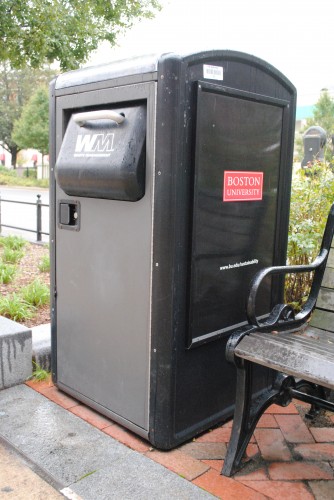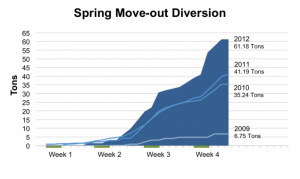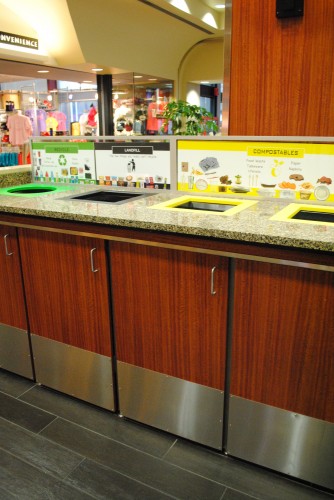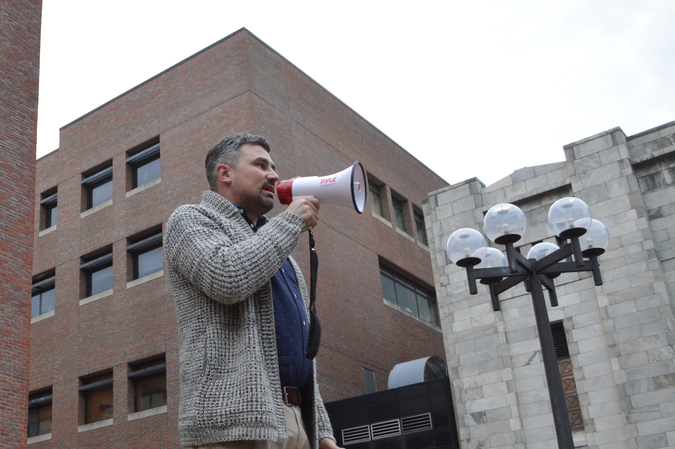Last issue, The Quad addressed the topic of environmental policy and sustainability in Boston. To better understand Boston University’s own environmental progress, I sat down with Dennis Carlberg, our Sustainability Director. Our conversation covered BU’s past, present, and future environmental improvements.

The Quad: So…the structure of the sustainability program is that your office administrates the program and there’s a steering committee. Is the committee responsible for determining which programs are activated?
Dennis Carlberg: So, yeah. Let me talk about the structure. We have the Sustainability Steering Committee, which is made up of senior administration, faculty, and staff. The Steering Committee meets three times a year. Then there are four working groups: energy conservation, sustainable buildings and operations, recycling and waste managemnt, and communications and outreach. Communications and outreach meets on a monthly basis. The other three meet on an as-needed basis, so they haven’t met much. In the first year all the groups met every other week. It was really intense. It was great.
That was in 2008?
That was in 2009. I started in January 2009, so for that year all the groups met every other week to come up with best practices for their issue areas. One of the things that came out of that was the Big Bellies you see on campus. That was one of the suggestions that came out of the recycling and waste management working group. They have met far less often because they haven’t really been needed.
As a background I think it’s helpful: I don’t think we would’ve made as much progress as quickly as we have without being able to look to our peers, talk to our peers, finding out what works for others—they don’t necessarily work for us—but at least having those conversations with other institutions about how they’re able to get things done and the ways they’re able to do them.
A perfect example is Harvard: it has this great end-of-year move-out program where they collect all the stuff that students leave behind. They have the facilites to do that. They have a large warehouse—a 35,000 square foot warehouse—where they bring all this stuff for the summer and they resell it during the fall. They can do that all internally; they have the staff to do that, they have volunteers through Habitiat for Humanity, they have trucks, and they have space. We have trucks but we don’t have anywhere near the capacity necessary to do that.
So from that came the problem we had to solve. These guys do this in a really awesome way. We want to do this in a really awesome way. We can’t do it the same awesome way, so what do we do? So, we partnered with Goodwill and I think we’ve hit an absolute homerun with them. They come by campus to pick up stuff during that period of move out, and all that stuff goes to support their community services. It supports the larger community in a really positive way. I like it better than what Harvard’s doing. A lot better.
That’s great.
That’s one example of learning from others. We go to conferences where we all share what we’re doing, and now we are at a point where we can share what we’re doing.

This segues very nicely into my first question and I’d like to start with waste reduction, because it seems to me like it’s the most sucessful program, just based on your number that now we have just a little under one third of all garbage being diverted through different means like compost, recycling, or donation. My first question was: when you’re moving towards such large numbers that come with sucessful sustainability programs, is it more difficult to implement these programs or sustain their rates of success? On your chart, 2009 was a pilot program, 2010 explodes, and then 2011 is small growth atop that initial success.
That’s a challenge. That’s a big challenge. Sustaining what we’re doing is not the challenge, but improving upon that quantum leap is a challenge. This is a perfect example. You can see how 2010 and 2011 were near the same but we got to another quantum leap for 2012. and in large part that’s learning from what we’ve done and communicate better, but mostly putting in place the systems that make it work. I think the big challenges have been getting Goodwill access to the dorms to get them access to the stuff. Everybody has their cars outside Warren Towers, for example.
Yeah, literal roadblocks.
The biggest challenge is Warren, West, and—during commencement weekend—StuVi 1 and StuVi 2. Goodwill is not permitted to go on those streets because they’re packed with people. Picking up the stuff is important, but we don’t want to be getting in the way of commencement, for example. We have to be able to hold stuff long enough to get them to pick it up, and there are times when it doesn’t end up going to Goodwill—it ends up going into the waste stream—and that’s really what we try to avoid.
This actually leads into my next question. Do you know, roughly, the contribution that residences and students make to the overall footprint of the University? They’re almost always on 24/7.

That’s a very good question. I’m not tracking those numbers. We really don’t do that right now. It’s something we could do as we look forward to building in competitions—which is a big part of the conversation right now—but there are things on our wishlist which we are definitely moving toward, but I don’t know when we’re going to get to implement. There’s an energy saving competition, which is really the best thing we can do as far as competitions to get students involved.
I assume behavior is the biggest challenge in getting changes to actually happen, in terms of usage. Do you find competition works better over education? I know I sometimes see educators standing by the trash bins at the GSU…
The GSU is a really good example. A lot of this is education. What we like to share, and this goes into our presentations when we talk at conferences like AASHE, which is the Association for the Advancement of Sustainability in Higher Ed, and what we’re sharing is that in 2011 we diverted 73% of our waste at the GSU. We had 31% in 2008, the first year we went trayless. 32% to 33% in ’09, in ’10 we got up to 60-something percent. This period between 2008 and 2009 was flat; okay, no real change. To get to this doubling between ’09 and ’10, that’s when we went to post-consumer sorting. So having those sorting stations has really had a huge impact and now we’re at 70-something percent. We’ll know 2012 when we get through the year but my guess is it’ll be pretty close to 73% again.
So what we’ve done is we’re able to plateau with new infrastrcuture, the sorting stations. The other really huge advantage of the sorting stations is that it gets us to behavior change and engaging the entire BU community. Anybody who uses the GSU has to figure out where to put their stuff. That causes people to think. And the first couple of weeks we have a green team there to help people understand how to sort and in the spring we’ll have a week that we’ll do that. So that really helps people understand that, yes, we’re doing something there, and, yes, we need people to get involved. I think one of the most important things here is that they have to participate. This is not a spectator activity.
And it won’t be done for them.
And if we do it for them now then when people leave and move on they won’t carry any behavior change.
So have you found any ways—outside changing that immediate decision making, like seminars or information sessions—to educate consumers one step further about what impact these decisions are having? Not only what are good habits but why they’re good habits?
We’re providing those kind of resources on our website for that, for people who are interested, that information is there. We give talks on campus all the time, mostly to student organizations that are interested in sustainability. Just gave one last night with USGBC Students, last week we did Earth House, the Environmental Coalition last week. So those are more for folks who are already engaged in the sustainability effort and to explain what exactly we are doing, so when people ask, “What is BU doing?” they have some answers.
So can you talk a bit about competition and why you think that’s a good direction to take?
I’d love to have much more robust competition than we do now. Other institutions—typically smaller institutions—have really powerful energy competitions. That’s the most important thing we need to be doing. Energy is the most important thing we need to be doing in the whole sustainability framework because it deals with reducing our carbon emissions, it deals with costs, and it’s where we need to be focusing our efforts. I’m anxious to have an infrastructure on campus where we can do that and that’s going to take some time. You need metics in order to have a competition, right? Again, smaller schools are able to pull this off more quickly because they’ve got meters everywhere and they can do dorm competitions and—
—It takes less investment.
Exactly. We—anybody—needs to be careful on how they spend money. We’re looking at how we can hold competitions in a cost effective way. RecycleMania we do every year, which is a recycyling competition. But we haven’t engaged the student population as much as I’d like to find a way to do.
Dennis Carlberg is the Director of Sustainabilty at Boston University. If you’d like to contact the Sustainability Program, either to ask a question or get involved, you can send an email to sustainability@bu.edu.



